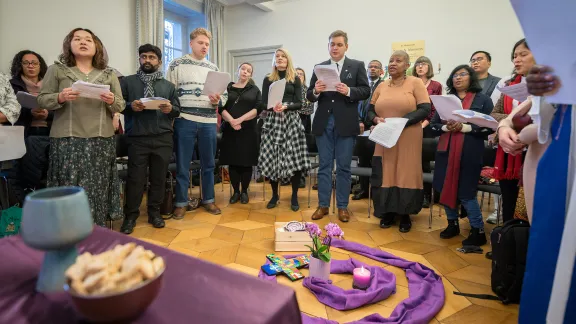
Participants gather for opening worship at the 9 to 11 December Gender Justice Consultation. Photo: LWF/A. Hillert
Participants from across the global communion gather in Geneva to explore future directions for the implementation of the Gender Justice Policy
(LWI) - What difference does faith make in the struggle for a more equitable and gender-just world? That was the question posed at the start of a three-day consultation celebrating achievements and strategizing future directions for the groundbreaking Gender Justice Policy of The Lutheran World Federation (LWF).
The policy, which provides theological, as well as practical principles for gender justice work in the churches, was adopted by the LWF Council on 18 June 2013 and launched on 10 December – Human Rights Day - in the same year. It has been translated into more than 20 languages and used by many churches to develop similar policies for their own local or national contexts. The 9 to 11 December consultation brings together theologians from across LWF’s member churches, gender justice network coordinators and Council members working in this field.
As keynote speaker at the opening of meeting in the Château de Bossey just outside Geneva, Rev. Dr Arnfríður Guðmundsdóttir, LWF Vice-President for the Nordic region, talked about the ways in which the language of faith has been used over the centuries to deny women their God-given dignity and human rights. The feminist theologian from the Evangelical Lutheran Church of Iceland, and professor at the University of Iceland, explored how Scripture is still being misused in many places today “to justify exclusion and abusive behavior towards women,” including denying them the possibility of ordination or leadership positions.
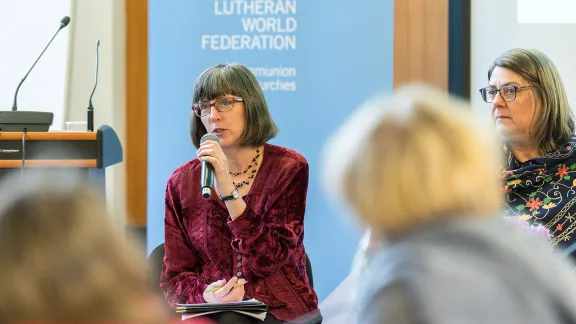
Dr Mary Streufert of the ELCA and Rev. Dr Elaine Neuenfeldt, former head of the LWF’s Women’s Desk, share memories of drafting the Gender Justice Policy. Photo: A. Hillert
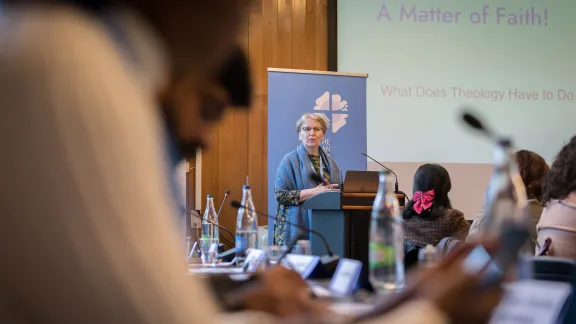
Rev. Dr Arnfríður Guðmundsdóttir, LWF Vice President for the Nordic region and keynote speaker at the Gender Justice Consultation. Photo: LWF/A: Hillert
Highlighting some of the tensions between the language of faith and human rights discourse, Guðmundsdóttir stressed that since its 1984 Assembly in Budapest, the LWF has reiterated an appeal to all of its member churches for a full inclusion of women in leadership. Over the past decade, she noted, the percentage of those churches that ordain women has increased. But the challenge, she insisted, goes beyond the numbers and requires the transformation of “systems of power and privilege which continue to discriminate and exclude.”
In the face of a worrying backlash against women’s rights in both church and society over recent years, Guðmundsdóttir underlined the importance of education at all levels of church life. “It is critical for our journey towards a more gender-just communion,” she said, that we “continue to pursue responsible theologies, inclusive language, a gender-sensitive re-reading of Scripture and the contextualization of our policy.”
As the authors of the LWF’s Gender Justice Policy found out over a decade ago, they really were breaking new ground in seeking to develop theological arguments to underpin the work of women’s empowerment in the church. Dr Mary Streufert of the Evangelical Lutheran Church in America, Rev. Dr Elaine Neuenfeldt of ACT Alliance and former head of the LWF’s Women’s Desk, and Fabian Wilches, LWF Senior Advocacy Advisor, were all part of a gender advisory group that began the drafting of a policy to carry forward the work that had been strongly affirmed by the global communion of churches at the 2010 LWF Assembly in Stuttgart.
Sharing memories and lessons learned during that process, they spoke of the many challenges they faced in finding language that would be accepted by leaders from very diverse theological and cultural contexts. “We discovered there were no pre-existing models in any other faith communities,” Streufert recalled, “and we came under pressure not to speak the language of faith but to focus on the human rights language.”
“We had to learn how to be strategic,” Neuenfeldt said, emphasizing the importance of listening and learning from colleagues in different parts of the global communion of churches. In the final draft of the policy, the biblical and theological foundations for gender justice work form a central pillar, alongside practical principles and clear methodologies for implementation. Since its adoption, Neuenfeldt notes, “the United Nations has recognized the importance of the LWF policy for its use of faith language.”
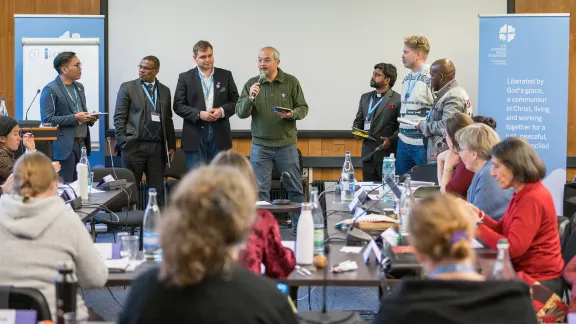
Rev. Dr Sivin Kit, LWF Director for Theology, Mission and Justice with other participants in the Gender Justice Consultation. Photo: A. Hillert
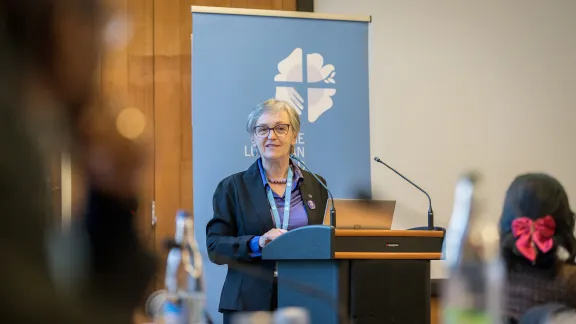
Rev. Dr Marcia Blasi, LWF Program Executive for Gender Justice and Women's Empowerment, welcomes participants at the opening of the Gender Justice Consultation. Photo: A. Hillert
The first day of the consultation included a session exploring the role and responsibilities of men in the grass roots work of gender justice. Youth leader Rev. Jussi Luoma, Evangelical Lutheran Church of Finland, an LWF Council member, pointed to a recent survey suggesting that a quarter of all young men in his country believe “women may deserve the violence they experience because of the way they look, dress or behave.” He stressed that “change begins with us, and we need the courage for self-reflection to model a different kind of masculinity.”
Rev. Kagiso Harry Morudu from the Evangelical Lutheran Church in Southern Africa noted the need to develop language that can “make sense” to young boys who are culturally conditioned to believe that “men must provide” for their families. “We have brought over the language of churches in the West,” he said, which may not resonate with young generations growing up in the Global South.
During a festive opening worship service, Rev. Dr Marcia Blasi, LWF Program Executive for Gender Justice and Women's Empowerment reminded participants that “we are not starting from the beginning but building on the work of courageous women leaders from the past.” She emphasized the vital role of partnerships between women and men to continue that legacy and “as we heard in our opening sermon, to work together for a world where the power of love will overcome the love of power.”
The 9 to 11 December Gender Justice Consultation is taking place in Geneva to celebrate achievements of the first decade since the adoption of the LWF Gender Justice Policy and to identify new strategies for building gender-just relations, theologies and churches within the LWF Communion and wider society.


